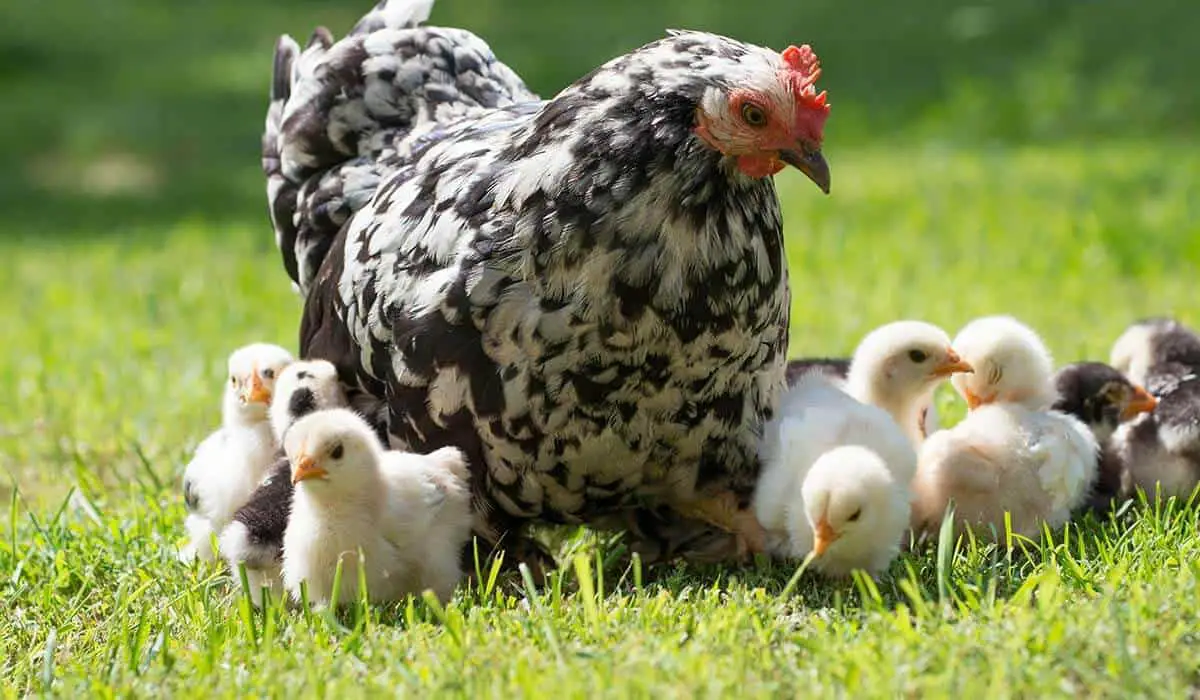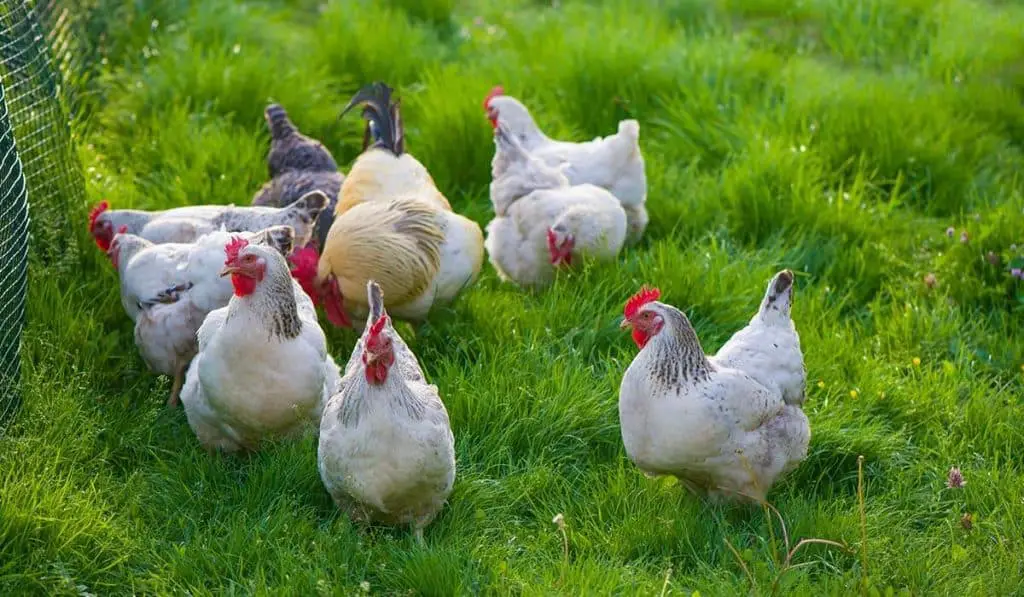Many people with chickens as pets tend to find themselves with flocks of different ages. Which constantly brings up the questions, can chickens of different ages live together?
Chicks can be territorial even when young and can pick on younger chicks when you introduce chicks of different ages. That said, it might not be safe to allow chicks of different ages to live together but it still is possible as long as you put in safety measures to protect the younger ones.
Chickens are aggressive and territorial, so you’ll want to know how to raise a happy healthy flock of all ages.

Can Chickens of Different Ages Live Together?
For new chicken owners, you’ll want to understand the importance of protecting your young hatchlings. Adult chickens can be quite aggressive in their nature.
After all, chickens and other birds did indeed evolve from dinosaurs.
Older chickens have a tendency to bully the smaller and younger chicks to assert their territory and superiority.
Isolating The Younger Ones?
That said, it’s not always safe to introduce younger chicks to older ones and allow them to live together. That’s why most people who raise chickens, try to keep their chicks of different ages isolated from one another until they are all fully grown.
But the truth is that not everyone has the room and the luxury to be able to isolate chicks of different age groups.
So, what’s the solution for those who just can’t isolate their chicks from one another?
Is it still possible for them to allow the chicks of different ages to live together? Of course, it’s possible but it doesn’t mean that it’s safe or that it’s easy.
In that regard, you have to implement certain techniques and safety measures that would allow you to safely integrate younger chicks in a society of older chickens without fearing the possibility of them getting bullied.
We will talk about that later. But rest assured that it is very much possible for you to integrate younger chicks with older chickens or even with an entire flock.
How Long Does It Take for Chickens to Get Used to Each Other?

Once you’ve tried to integrating younger chicks together with older chickens, it might take some time for them to get used to one another because there are a lot of factors that can play a role.
This can include the age gap between the chicks and the chickens as well as the difference in numbers between the two groups.
However, as long as you follow the right techniques in integrating chicks together with chickens in a flock and as long as you try to minimize the chances of aggression, it might not take more than two days for them to act like a real flock.
In some cases, aggression totally disappears in a matter of only 24 hours as long as you do things right.
In short, it really depends on a lot of different factors but the important thing to keep in mind here is to make sure that you do your part in trying to minimize the chances of the older chicks or the adult chickens of picking on the younger chicks.
As long as you do that, it might not even take more than a full day for them to get used to one another and to erase any sort of aggression against each other.
What Do You Feed Chickens at Different Ages?
Another challenging part of raising chickens of different ages that are living in one group is food. Younger chickens have different nutritional needs than older chickens, so they will require a different type of feed.
For example, laying hens need calcium for their eggs but the same mineral shouldn’t be taken in by younger chicks.
In that case, you have to make sure that you feed the chickens of different ages with different food. Always read the label to ensure your chicks are receiving the proper nutrients that are required.
Feeding The Young Chicks
Chickens of the same age tend to flock together when they are still young. As such, it will be easy for you to feed the chicks with whatever food is appropriate for them such as a medicated starter pack.
Meanwhile, for the laying hens, make sure they don’t eat the medicated chick starter packs because the medication wouldn’t be good for the eggs.
Instead, you can use flock raiser pellets for your laying hens and make sure to place their food in smaller containers such as bowls that are the size of oyster shells so that you won’t be seeing chicks trying to eat from the food of the laying hens.
How To Integrate Baby Chicks Into a Flock
If you have baby chicks that are only a few days old, it can be difficult to integrate them into a flock. But that doesn’t mean that it’s impossible to do so.
Tips for Introducing The Chicks to the Flock:
- You can outnumber the older chicks with younger chicks. For example, you can put 20 two-day-old chicks together with one or two five-day-old chicks. It still is possible for the older chicks to bully the younger ones but you will quickly notice how the numbers will begin to stack against them that they would eventually stop bullying the younger and smaller chicks.
- Don’t try to integrate day-old chicks with hens that are still laying because of how large the age gap is. This can be dangerous on the part of the chicks. Instead, isolate the chicks at first and allow them to grow a bit until they are big enough to get integrated into a society of older and adult chickens.
- Try to introduce chicks of different ages to an entirely new environment. The root of aggression can sometimes be the chickens’ territorial instincts. But this can be minimized if both groups are not familiar with the new environment you placed them in. So, instead of fighting with each other, these chicks would use up all of their energy to try to adjust to the new environment.
- Make sure that there is enough space for the chicks. That means that don’t try to keep them in a cramped space. With enough room, they might be able to do more things and they might end up minimizing their own territorial instincts. If there is a lot of room for the chicks to roam, it is actually safe for you to integrate them together with the hens as well.
- When you are integrating younger chicks with older chickens, do so when the sun is about to set. That way, the older chickens won’t have enough energy to try to bully the younger chicks because they would rather sleep and rest instead.
- Try to be present when you integrate your chicks with a flock of older or even grown-up chickens. That way, you can hang out with them and keep the older chickens or even break up any fight that is about to start. It is quite common for adult chickens to peck on smaller and younger chicks or even draw blood. But with you around, the chances can be minimized.
- Keep the adult chickens and the older chicks something else to do rather than to just allow them to pick on the smaller chicks. Give them food and water so that they would be too busy to mind the younger chicks around them.
- After introducing the chicks to the flock, try to watch over them for at least an hour. This will allow you to quickly act on any signs of aggression you see from the adults.
Final Word
Yes, chickens of all ages can live together. However, young chicks should be isolated for at least 30 days from the rest of the flock. After 30 days, they can join the rest of the flock.
References and Further Reading
Backyard Chickens – Territorial Chickens
NCBI – Thinking Chickens: A Review of Cognition, Emotion, and Behavior in the Domestic Chicken
